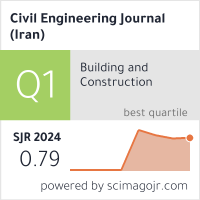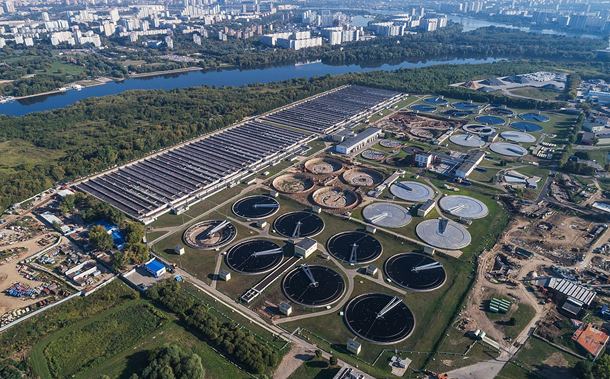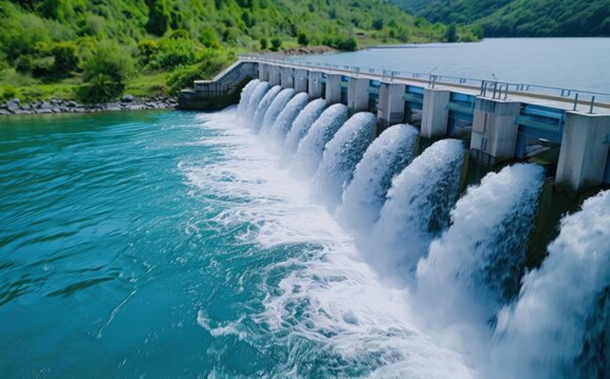Application of Electrodialysis Process for Reduction of Electrical Conductivity and COD of Water Contaminated By Composting Leachate
Downloads
The presented paper describes an experimental study to reduce electrical conductivity (EC) of composting leachate-polluted water by using electrodialysis (ED) process. High efficiency, simple operation, low waste generation and selectivity are considered as major advantageous of applying ED process. Along with evaluation of ED method for desalination, the possibility of the process for COD (chemical oxygen demand) removal was also studied. The impact of- applied voltage, feed concentration and process time on ED performances were investigated. Increasing of the applied voltage and decrease of feed concentration enhanced the reduction of EC and improved the COD removal from the sample. At optimal condition (Voltage=10 Volt, feed solution=Cf/4 and time operation=120 min), the reduction of EC and COD removal were 92.7%, and 83.8%, respectively. Applying higher voltage and using more feed solution concentrations resulted in more energy consumption. The obtained results showed that ED method can be considered as an acceptable method to reduce salt and organic content.
Downloads
[2] Bakhshoodeh, R., Alavi, N., Majlesi, M., Paydary, P. "Compost leachate treatment by a pilot-scale subsurface horizontal flow constructed wetland.” Ecological Engineering, 105(2017): 7-14. https://doi.org/10.1016/j.ecoleng.2017.04.058.
[3] M. Çakmakci, M., Özyaka, V. "Aerobic Composting Leachate Treatment By the Combination of Membrane Processes.” Waste Management & Research 31 (2012): 187-193 doi: 10.1177/0734242X12462283.
[4] Trujillo, D., Font, X., S´anchez, A. "Use of Fenton Reaction for the Treatment of Leachate from Composting of Different Wastes.” Journal of hazardous materials 138 (2006): 201-204. https://doi.org/10.1016/j.jhazmat.2006.05.053.
[5] Hu, L., Liu, Y., Zeng, G., Chen, G., Wan, J., Zeng, Y., Wang, L., Wu, H., Xu, P., Zhang, C., Cheng, M., Hu, T. "Organic matters removal from landfill leachate by immobilized Phanerochaete chrysosporium loaded with graphitic carbon nitride under visible light irradiation. ” Chemosphere 184 (2017): 1071-1079. https://doi.org/10.1016/j.chemosphere.2017.06.065.
[6] Umar, M., Aziz, H. A., Yusoff, M. S. "Trends in Use of Fenton, Electro-Fenton and Photo-Fenton for the Treatment of Landfill Leachate.” Waste Management 30 (2010): 2113-2121. https://doi.org/10.1016/j.wasman.2010.07.003.
[7] Manavi, N., Kazemi, A. S., Bonakdarpour, B. The development of aerobic granules from conventional activated sludge under anaerobic-aerobic cycles and their adaptation for treatment of dyeing wastewater.'' Chemical Engineering Journal 312(2016): 375-384. https://doi.org/10.1016/j.cej.2016.11.155.
[8] Ward, A.J., Arola, K., Brewster, E., Mehta, C. "Nutrient recovery from wastewater through pilot scale electrodialysis.” Water Research 135(2018): 57-65 https://doi.org/10.1016/j.watres.2018.02.021.
[9] Liu, R., Wang, Y., Wu, G., Luo, J., Wang, S. "Development of a selective electrodialysis for nutrient recovery and desalination during secondary effluent treatment.” Chemical Engineering Journal 322(2017): 224-233. https://doi.org/10.1016/j.cej.2017.03.149.
[10] Wang, Y., Li, W., Yan, H., Xu, T. "Removal of heat stable salts (HSS) from spent alkanolamine wastewater.” Journal of Industerial Engineering Chemistry 57(2018): 356-362. https://doi.org/10.1016/j.jiec.2017.08.043.
[11] Dobrevsky, I. V., Pavlova, S. T. "Organic Matter Removal from Natural Waters by Electrodialysis Demineralization.” Desalination 86 (1992): 43-48. https://doi.org/10.1016/0011-9164(92)80022-2.
[12] Hell, F., Lahnsteiner, J., Frischherz, H., Baumgartner, G. "Experience with Full-Scale Electrodialysis for Nitrate and Hardness Removal.” Desalination 117 (1998): 173-180. https://doi.org/10.1016/S0011-9164(98)00088-5.
[13] Lee, H. J., Oh, J., Moon, S. H. "Removal of Hardness in Fermentation Broth by Electrodialysis.” Journal of Chemical Technology and Biotechnology 77 (2002): 1005-1012. https://doi.org/10.1002/jctb.671.
[14] Kabay, N., Demircioglu, M., Ersiiz, E., Kurucaovali, I. "Removal of Calcium and Magnesium Hardness by Electrodialysis.” Desalination149 (2002): 343-349. https://doi.org/10.1016/S0011-9164(02)00807-X.
[15] Lee, H. J., Hong, M. K., Moon, S. H. "A Feasibility Study on Water Softening by Electrodeionization with the Periodic Polarity Change. ” Desalination 284 (2012): 221-227. https://doi.org/10.1016/j.desal.2011.09.001.
[16] Deghles, A., Kurt, U. "Treatment of tannery wastewater by a hybrid electrocoagulation/electrodialysis process.” Chemical Engineering and Processing: Process Intensification” 104(2016): 43-50. https://doi.org/10.1016/j.cep.2016.02.009.
[17] Tamersit, S., Bouhidel, K-E., Zidani, Z. "Investigation of electrodialysis anti-fouling configuration for desalting and treating tannery unhairing wastewater: Feasibility of by-product recovery and water recycling.” Journal of Environmental Management 207(2018) 334-340. https://doi.org/10.1016/j.jenvman.2017.11.058.
[18] Zhang, X., Li, C., Wang, X., Wang, Y., Xu, T. "Recovery of Hydrocholoride Acid from Simulated Chemosynthesis Aluminium Foils Wastewater: An Integration of Diffusion Dialysis and Conventional Electrodialysis.” Journal of Membrane Science 409 (2012): 257-263. https://doi.org/10.1016/j.memsci.2012.03.062.
[19] Mulyati, S., Takagi, R., Fujii, A., Ohmukai, Y., Maruyama, T., Matsuyama, H. "Improvement of the Antifouling Potential of an Anion Exchange Membrane by Surface Modification with Polyelectrolyte for Electrodialysis Process.” Journal of Membrane Science. 417-418 (2012): 137-143. https://doi.org/10.1016/j.memsci.2012.06.024.
[20] Jing, G., Du, W., Guo, Y. "Studies on the Prediction of Separation Percent in the Electrodialysis Process Via BP Neural Network and Improved BP Algorithm.” Desalination 291 (2012): 78-93. https://doi.org/10.1016/j.desal.2012.02.002.
[21] Kabay, N., Arar, O., Samatya, S., Yuksel, U., Yuksel, M. "Separation of Fluoride from Aqueous Solution by Electrodialysis: Effect of Process Parameters and Other Ionic Species.” Journal of hazardous material, 153 (2008): 107-113. https://doi.org/10.1016/j.jhazmat.2007.08.024.
[22] Rohman, F. S., Othman, M. R., Aziz, N. "Modelling of Batch Electrodialysis for Hydrochloric Acid Recovery.” Chemical Engineering Journal 162 (2010): 466-479. https://doi.org/10.1016/j.cej.2010.05.030.
[23] Parsa, N., Moheb, A., Mehrabani-Zeinabad, A. Masigol, M. A., "Recovery of Lithium Ions from Sodium-Contaminated Lithium Bromide Solution by Using Electrodialysis Process.” Chemical Engineering Research and Design 98 (2015) 81-88. https://doi.org/10.1016/j.cherd.2015.03.025.
[24] Selvaraj, H., Aravind, P., Sundaram, M. "Four compartment mono selective electrodialysis for separation of sodium formate from industry wastewater.” Chemical Engineering Journal 333(2018): 162-169. https://doi.org/10.1016/j.cej.2017.09.150.
[25] Merkel, A., Ashrafi, A. M., OndruŠ¡ek, M.” The use of electrodialysis for recovery of sodium hydroxide from the high alkaline solution as a model of mercerization wastewater.” Water Process Engineering 20 (2017): 123-129. https://doi.org/10.1016/j.jwpe.2017.10.008.
[26] Lienhard, J.” Electrodialysis shows potential for desalination of highly saline water.” Membrane Technology 2015 (2015): 7. https://doi.org/10.1016/S0958-2118 (15)30058-6.
[27] Luo, F., Wang, Y., Jiang, C., Wu, B., Feng, H., Xu, T. "A power free electrodialysis (PFED) for desalination.” Desalination 404(2017): 138-146. https://doi.org/10.1016/j.desal.2016.11.011.
[28] Sadrzadeh, M., Mohammadi, T. "Treatment of Sea Water Using Electrodialysis: Current Efficiency Evaluation.” Desalination 249 (2009): 279-285. https://doi.org/10.1016/j.desal.2008.10.029.
[29] Valero, D., Garcia, V., Exposito, E., Aldaz, A., Montiel, V. "Application of electrodialysis for the treatment of almond industry wastewater.” Journal of Membrane Science 476(2015): 580-589. https://doi.org/10.1016/j.memsci.2014.11.007.
[30] Cui, L., Li, G., Li, Y., Yang, Bo, Zhang, L., Dong, Y. "Electrolysis-electrodialysis process for removing chloride ion in wet flue gas desulfurization wastewater (DW): Influencing factors and energy consumption analysis.” Chemical Engineering Research and Design 123 (2017): 240-247. https://doi.org/10.1016/j.cherd.2017.05.016.
[31] Oren, Y., Linder, C., Daltrophe, N., Mirsky, Y., Skorka, J., Kedem, O. "Boron Removal from Desalinated Seawater and Brackish Water by Improved Electrodialysis.” Desalination 199 (2006): 52-54. https://doi.org/10.1016/j.desal.2006.03.141.
[32] Abou-Shady, A. "Recycling of polluted wastewater for agriculture purpose using electrodialysis: Perspective for large scale application.” Chemical Engineering Journal 323 (2017): 1-18. https://doi.org/10.1016/j.cej.2017.04.083.
[33] Sadyrbaeva, Zh.” Removal of chromium(VI) from aqueous solutions using a novel hybrid liquid membrane”electrodialysis process.” Chemical Engineering and Processing: Process Intensification 99 (2016): 183-191. https://doi.org/10.1016/j.cep.2015.07.011.
[34] Melnikov, S., Sheldeshov, N., Zabolotsky, V., Loza, S., Achoh, A.” Pilot scale complex electrodialysis technology for processing a solution of lithium chloride containing organic solvents.” Separation and Purification Technology 189 (2017): 174-81. https://doi.org/10.1016/j.seppur.2017.07.085.
[35] Reig, M., Casas, S., Aladjem, C., Valderrama, C., Gibert, O., Valero, F., MiguelCenteno, M., Larrotcha, E., Cortina., J. L. ” Concentration of NaCl from seawater reverse osmosis brines for the chlor-alkali industry by electrodialysis.” Desalination 342 (2014): 107-117https://doi.org/10.1016/j.desal.2013.12.021.
[36] Xu, X., He, Q., Ma, G., Wang, H., Nirmalakhandan, N., Xu, P. ” Selective separation of mono- and di-valent cations in electrodialysis during brackish water desalination: Bench and pilot-scale studies.” Desalination 428 (2018): 146-160. https://doi.org/10.1016/j.desal.2017.11.015.
[37] Lemaire, J., Blanc, C. L., Duval, F., Théoleyre, M.A., Pareau, D. ” Purification of pentoses from hemicellulosic hydrolysates with sulfuric acid recovery by using electrodialysis.” Separation and Purification Technology 166 (2016): 181-186. https://doi.org/10.1016/j.seppur.2016.04.030.
[38] Chekioua, A., Delimi, R.” Purification of H2SO4 of Pickling Bath Contaminated by Fe(II) Ions Using Electrodialysis Process.” Energy Procedia 74 (2015): 1418-1433. https://doi.org/10.1016/j.egypro.2015.07.789.
[39] Rottiers, T., Van der Bruggen, B., Pinoy, L.” Synthesis and transport of impurities in electrodialysis metathesis: Production of choline dihydrogen phosphate.” Membrane Science 541 (2017): 550-557. https://doi.org/10.1016/j.memsci.2017.07.042.
[40] Guo, H., You, F., Yu, S., Li, L., Zhao, D. "Mechanism of chemical cleaning of ion exchange membranes: A case study of plant-scale electrodialysis for oily wastewater treatment.” Journal of Membrane Science, 496(2015): 310-317. https://doi.org/10.1016/j.memsci.2015.09.005.
[41] Abou-Shady, A., Peng, C., Almeria, J., Xu, H. "Effect of pH on Separation of Pb(II) and NO3- from Aqueous Solutions Using Electrodialysis.” Desalination 285 (2012): 46-53. https://doi.org/10.1016/j.desal.2011.09.032.
[42] Wang, A., Nie, Y., Zhang, X., Zhang, S., Li, J. "Recovery of Ionic Liquids from Diluted Aqueous Solution by Electrodialysis.” Desalination 285 (2012): 205-212. https://doi.org/10.1016/j.desal.2011.10.003.
[43] Fidaleo, M., Moresi, M., Cammaroto, A., Ladrange, N., Nardi, R., Soy Sauce Desalting by Electrodialysis.” Journal of Food Engineering 110 (2012): 175-181. https://doi.org/10.1016/j.jfoodeng.2011.06.002.
[44] Masigol, M. A., Moheb, A., Mehrabani-Zeinabad, A. "An Experimental Investigation Into Batch Electrodialysis Process for Removal of Sodium Sulfate from Magnesium Stearate Aqueous Slurry.” Desalination 300 (2012): 12-18. https://doi.org/10.1016/j.desal.2012.05.025.
[45] Keramati, N., Moheb, A., Ehsani, M. R. "Effect of Operating Parameter on NaOH Recovery from Waste Stream of Merox Tower Using Membrane System: Electrodialysis and Electrodeionization.” Desalination 259 (2012): 97-102. https://doi.org/10.1016/j.desal.2010.04.027.
[46] Yu, L., Guo, Q., Huo, J., Jiang, W. "Recovery of Acetic Acid from Dilute Wastewater by Means of Bipolar Membrane Electrodialysis.” Desalination 129 (2000): 283-288. https://doi.org/10.1016/S0011-9164(00)00068-0.
[47] Wei, Y., Li, C., Wang, Y., Zhang, X., Li, Q., Xu, T. "Regenerating Sodium Hydroxide from the Spent Caustic by Bipolar Membrane Electrodialysis.” Separation and Purification Technology 86 (2012): 49-54. https://doi.org/10.1016/j.seppur.2011.10.019.
[48] Wu, R. C., Xu, Y. Z., Song, Y. Q., Luo, J. A., Liu, D. "A Novel Strategy for Salts Recovery from 1,3-Propanediol Fermentation Broth by Bipolar Membrane Electrodialysis.” Separation and Purification Technology 83 (2011): 9–14. https://doi.org/10.1016/j.seppur.2011.06.028.
[49] Masigol, M. A., Moheb, A., Mehrabani-Zeinabad, "A. Comprehensive Study on Interactive Effects of Operational Parameters By Using Response Surface Method for Sodium Sulfate Removal from Magnesium Stearate Aqueous Slurry via Electrodialysis Process.” Desalination and water treatment 57 (2015): 14145-14157. https://doi.org/10.1080/19443994.2015.1062426.
- Authors retain all copyrights. It is noticeable that authors will not be forced to sign any copyright transfer agreements.
- This work (including HTML and PDF Files) is licensed under a Creative Commons Attribution 4.0 International License.![]()















